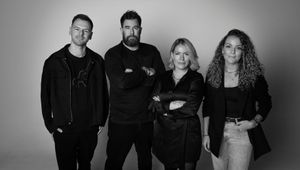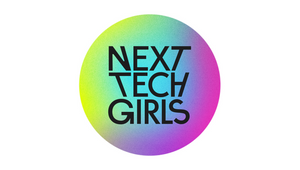
5 Minutes with… Dani Bassil

Dani Bassil is the problem solvers’ problem solver. With her proactive attitude and lateral thinking, it shouldn’t be all that surprising that the CEO of Digitas UK started her career as a producer. Only it is – because, aside from the odd agency that has a chief production officer, you rarely find producers in the agency C-suite. But for Dani, who started off her working life working in the production department of an Australian newspaper, it always felt very natural to apply her skills more broadly.
She moved to the UK fifteen years ago and found her way to
leadership through operations. She joined Digitas as COO in 2017 and now she’s
running the shop as CEO. LBB’s Laura Swinton caught up with her.
LBB> You’re CEO at Digitas now, but I hear you started out
your career in production. Is that true?
Dani> It’s true I didn’t grow up in the traditional sales or account management function. I think it’s good and it’s an interesting thing that our industry generally pigeonholes. I think that’s a bit of a flaw and I hope that that changes. Some of the younger people come through who are more multiskilled across a few departments but, throughout my whole career, I’ve been told by many CEOs that I would never be MD because I’m not a traditional suit.
LBB> What do producers bring to business leadership roles?
Dani> We certainly know how to get shit done! If you want
something done, give it to a producer. And we have real lateral thinking skills
thinking really laterally. A production is essentially a complex problem that
we need to solve. I know what we need to make, I know how much time we have and
how much money we have, so how do I solve this complex problem and make the
best thing I could possibly make? It’s not that dissimilar to general business.
Businesses are always solving problems. It’s about taking that
tool set and applying it to wider client business problems and your own agency
business issues, which you face every day when you’re running a company.
Producers have than lateral thinking and are able to bring people along with them. That’s the best skill that I learnt – taking people who are beaten up, tired and motivating them to want to keep going to get over the finish line. That is what running a company is like sometimes too.
LBB> What was your way into the industry to begin with?
Dani> It’s a funny thing. I studied economics at
university and I actually dropped out because I wanted to work. I grew up in Australia
and I wanted to get some money together to travel. And then once I started work,
I fell in love with that and never went back.
My very first job was working for Murdoch newspapers in Sydney, their advertising department. Booking ads. I think we were one of the first papers in Australia to have colour, so working with the production department to figure how to do colour, what advertisers needed to do to make great colour ads. I got to know the agencies because I worked with them all the time and I got offered the role in production at one of the big agencies in Sydney.
LBB> And when you started did you have any mentors?
Dani> No. I never had a mentor ever. I think I just sort of worked it out for myself. This was 23 years ago, working in a newspaper with a whole bunch of production blokes. I thought, if I didn’t know something they would try and tell me some bullshit. So, I decided that I had to learn everything I could so that I had the knowledge. I’ve always taken that philosophy on board of wanting to learn and learn. I then went on to advertising and began to learn all about production and project management, producing from a shoot perspective. I wanted to learn about what the director was doing, what the stylist was doing. Learn, learn, learn. And then I took that on board more broadly. “OK the client’s given us a business problem, what does that mean?” And I went from there really.
LBB> When did you move over to the UK?
Dani> I’ve been here 15 years now. I did that typical Aussie thing where I came over for – in my mind - two years and freelanced at various agencies from M&C Saatchi to Howell Henry. I think Mother was my first full time gig and I worked on Orange. I think that was the pivot moment for me because I was also an account person there. I loved that and it was when I started to realise that was more what I wanted to do. I’ve always been about hybrid account management. How can I do my job most effectively as a PM or a producer unless I know the client and I know what motivates them?
LBB> When you started levelling up in your career you
moved from production to operations. How unusual is that?
Dani> It’s more common, I think. I think because I was
told by many people that I wouldn’t get into senior management as I wasn’t a
traditional suit, I saw that as my only way.
Operations is about how we structure and run a big piece of
business when we land it, how do we onboard the client? There’s all that sort
of stuff and then wider agency operations too. How is the business going to run
most effectively to deliver for our clients? And that went into a COO role in
an agency and I got to really get under the skin of the P&L and how it
works.
I think because I’m not a traditional salesperson, my motivations around how I run an agency are slightly different. I probably think about the agency as much as I think about the client. I think culture is critical to having a successful business, whatever it is. At Digitas, I’ve been able to define that with a group of people I’ve picked to be my team to do that and that’s a real privilege.
LBB> Did you ever have a point when you thought about
what kind of leader you wanted to be?
Dani> No one tells you how to do it and there are moments
of real reflection, of, “am I able to do this?” Impostor syndrome. Especially with
women.
It’s something I continuously ask myself. I l look at the
people I respect as leaders and take what I think as good leadership from them
and look at the leaders that I think weren’t great and make sure that I don’t
do the same things that they’ve done. I think about that all the time.
But honesty has to be the bedrock of any leader. If you
don’t have integrity and honesty then people just won’t follow you; sometimes
you need people to follow you to places they don’t think they want to go, so
you need that honesty to get them to back you, to move forward.
Sometimes it’s really hard. Digitas has had a lot of change
over the past five years so getting people to buy into your vision is so
critical to continue to build a successful business.
LBB> Joining Publicis Groupe and Digitas would have
really put that to the test. They’ve had a vision of where they want to be for
some time. A few years ago, people in the industry were a bit sniffy about what
they were doing because they didn’t necessarily get it. That long-term view
takes time to bed in and unfold and take shape.
Dani> I totally agree. I thought, naively, that any group would be the same as where I had come from, which was WPP. I joined Digitas, fell in love with the agency and thought it was a place of such diverse skillsets and talent – I’ve been blown away by everyone in that place. I just thought Publicis Groupe would be exactly like WPP but I’ve been pleasantly surprised at how much more flexible it is as a leader, how much more modern and forward thinking it is. Obviously WPP has changed a lot too since I’ve let, but I’ve been really, really impressed with the Groupe and how collaborative it is. Whereas with other holding companies it can be much more combative, we all know each other really well. Annette King has done a brilliant job of bringing everyone together too.
LBB> Speaking of Annette, it’s noticeable that across Publicis in the UK, there’s a lot of great senior women in top roles. Why do you think that is?
Dani> I don’t think that I would have been offered the role if it hadn’t been two women making the decision. Honestly and in my heart, that’s what I believe. I’d hope that that wouldn’t have been true but I think it is.
I’d before never had a female boss in 21 years of working in the industry. Never. Not once. And now I have Sue Frogley, who I report into and then Annette. It’s so different. I’m not slagging it off because I’ve had some amazing male bosses too but there’s something about the vision, but also the pragmatism of getting things done and making really important, sensible decisions that can be implemented. Honestly, we have to have more of a blend of diversity in our industry at that senior level or we’ll just keep making the same things and we won’t survive.
LBB> You’ve been there about two years now. What have
been your highlights?
Dani> There have been so many. Being able to build an
exec team has been an amazing privilege. Bringing Emma De La Fosse on board and
Matt Holt on board. They are an incredible group of people and I love coming
into work every day. That’s been a massive highlight, and the successes that
we’ve had over the past year.
People have been talking about Digitas again, which they weren’t doing before – we were a bit of a sleepy business that wasn’t in the news much. There seems to be quite a buzz now about what’s going on at Digitas and I think that’s a really cool thing to because, as I said, I think there’s a lot of talent and a lot of hard work that goes into the things we do.
LBB> And as the CEO of a business like Digitas that spans
media, products, platforms, services, content and tech I imagine that producers
mindset helps as every problem really is different…
Dani> 100%. There are always different types of
producers. What I would always say to my team was tell me what the problem is,
how much time I have and how much money I have. That’s the thing that I love.
We’re constantly thinking about emerging technology and what
it means for our clients… and what it means for a CPG client versus a financial
services client versus an auto client will be different. It’s so varied and
complex. I think that problem solving is the most fun part of the job.
LBB> Let’s talk about the consultancy side of the
business – I’m so curious as that’s a very different conversation with clients
and dealing with a very different competitor set. How open have you found
businesses are to that offering?
Dani> It’s really interesting because there are times
that we won’t be considered obviously because our focus is digital and if you
want an Ernst & Young, big broader business consulting thing that’s probably
not going to be us. But we go up against some of the other digital consultancies.
What I really like about our offering is that we not only
help you develop your strategy, depending on what your problems are, it’s we
will actually help you implement it. We’re not in the business of delivering a £5m
Power Point document and then walking away. We want to actually build it, help
you make it and help you run your change management programme with your
internal stakeholders to get whatever it is they’re building working
effectively, and continue to upgrade that. That is resonating really well because
a lot of consultancies will do is charge a lot of money for a document and walk
away and nothing ever happens. That’s not what we do. And that story is working
for the moment and I think it will be a really big part of the business moving
forward.
LBB> On a more general level, looking at the shifts in
the industry, what is frustrating you and what’s exciting you?
Dani> I think there’s so much opportunity right now. I
know there’s a lot of doom and gloom around the industry but for a business
like us, everywhere I look there’s opportunity to do brilliant things and grow.
At the moment, when I look at my road map for the next three
to five years, I’ll be opening up a new division every three to five years
because of the nature of our business. Last year we opened an experience
consulting part of our business, which is critical to how we take on some of
our big engagements and help our clients through some of the bigger challenges
they have. This year, I think it will be something more product focused. It’s
an incredible time for an agency like us because there’s so much going on from
a digital perspective.
And then I think that the reverse of that is we’ve got a
challenging economic environment that I can’t predict. I don’t remember a time
when it’s been like this. It’s not terrifying, I’m not lying awake thinking "oh
my god what’s going to happen"… but it’s just very unpredictable. And I think
that’s such a shame because whether you’re a Brexiteer or a Remainer, the UK is
such a vibrant place for creativity and full of exciting tech start-ups and I
just hope that we don’t lose that as an economy. That’s my biggest worry.
Tanking the economy or not, we’ll survive because we’ve still got a healthy
country but I hope that those things don’t suffer as a result.















